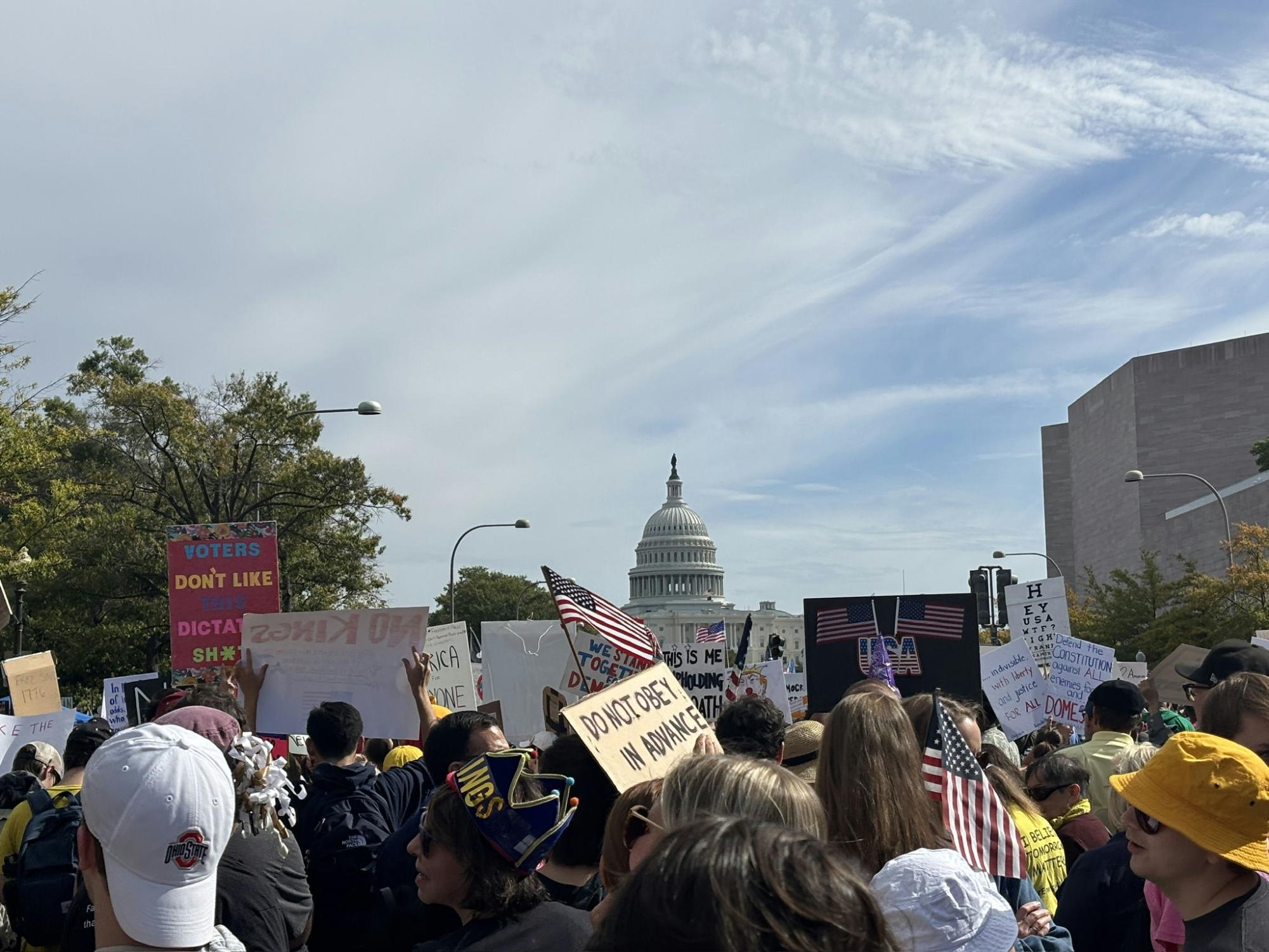Georgetown University students joined 200,000 demonstrators at the “No Kings” national protest in Washington, D.C., on Oct. 18 to condemn the expansion of President Donald Trump’s executive power.

Seven million demonstrators gathered in more than 2,700 cities and towns across all 50 states to vocalize concerns over attacks on democratic institutions, aggressive United States Immigration and Customs Enforcement (ICE) operations, National Guard deployments in U.S. cities and reductions in federal funding. Over 50 Georgetown students attended the D.C. protest, including members of the Georgetown chapter of the legal nonprofit American Civil Liberties Union (ACLU), Georgetown University College Democrats (GUCD) and the student chapter of Free D.C., a local group advocating for D.C. statehood and self-governance.
Elinor Clark (CAS ’27), GUCD’s Director of Advocacy, who attended the protest, said it is crucial for broad segments of the population to speak out against the Trump administration.
“I think it’s really important to show the world and our leaders that we’re not okay with this and that large portions of the population do not agree with what the Trump administration is doing,” Clark told The Hoya.
Protestors rallied on Pennsylvania Avenue, near the U.S. Capitol and White House. They chanted slogans including “This is what democracy looks like,” “No kings” and “The people united will never be defeated.”
Hannah Hanson (SOH ’21), who attended the protest, said being among the thousands of protesters made her feel she had the power to make a difference.
“It’s really easy to feel like you are alone and have no power when you’re reading headlines or seeing news stories and just feel demoralized about it,” Hanson told The Hoya. “But I think coming to a protest and seeing how many people are here and care — I think it helps feel like we do have power.”
Sen. Bernie Sanders (I-Vt.), who spoke at the rally, said protesting the Trump administration is a patriotic duty.
“Millions of Americans are coming out today, not because they hate America — we’re here because we love America,” Sanders said to the crowd. “We’re here because we’re going to do everything we can to honor the sacrifices of millions of men and women who over the last 250 years fought and sometimes died to defend our democracy and our freedoms.”
Carleigh Heckel (CAS ’27), a member of Georgetown’s chapter of Free D.C. who attended the protest, said she was moved by the many different causes represented at the rally.
“There were so many people there,” Heckel told The Hoya. “There was such a diversity of signs and groups that people were coming with and causes that people cared about. And I think that kind of coalition building is super important.”
Tony Guarda, who attended the protest with Refuse Fascism, an anti-Trump protest organization, said he demonstrated because he is afraid of the effects of federal immigration enforcement on his community.
“What’s going on is not normal,” Guarda told The Hoya. “This is not what America stands for. Our Latino brothers and sisters are suffering right now. They are not sleeping because they are afraid even to go to work. Children are afraid that they won’t see their parents at the end of the day. Mothers are afraid that they won’t see their children.”
The Trump administration has intensified its immigration enforcement efforts, conducting large-scale raids targeting undocumented immigrants.
Reports show that during the first five months of the Trump administration, ICE arrested 40,000 undocumented Mexican immigrants and is targeting immigrants mostly from Latin America and the Caribbean. In September, the Supreme Court allowed federal immigration agents to stop and question people based partly on race, language or job type, which civil rights groups and the dissenting justices condemned as legalizing racial profiling.
Lucas Lyons, a D.C.-based community organizer who attended the protest, said the demonstration was impactful as an important step toward change.
“Everyone has the energy to fight fascism and to organize, but it takes that shared solidarity, shared commitment to each other to actually make it happen,” Lyons told The Hoya. “And I feel like that’s what we’re seeing today.”
The first “Kings Day of Defiance” demonstration was held in June to protest the Trump administration amid allegations of anti-democratic measures, drawing five million people across the United States. In January, the People’s March mobilized 50,000 people in D.C. to demand accountability from the Trump administration and reaffirm commitments to voting rights and democratic governance.
Nicholas Cefalu (CAS ’27), the president of Georgetown’s ACLU chapter, who also attended the protest, said that protesting is important but it is not enough to make a significant impact on important issues.
“I’m really hoping that people keep waking up to what this administration is doing and push back a little more and hopefully they change how they vote, more importantly,” Cefalu told The Hoya.
Clark said she hopes the protests impact the wider U.S. electorate.
“I hope more than anything that people who are on the margins, who don’t want to pick a side, are swayed by this show of support for progress,” Clark said. “Join our fight. There’s strength in numbers. This is how we can make a difference.”